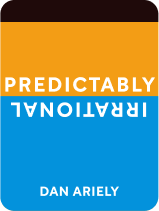

This article is an excerpt from the Shortform book guide to "Predictably Irrational" by Dan Ariely. Shortform has the world's best summaries and analyses of books you should be reading.
Like this article? Sign up for a free trial here .
How does emotional arousal effect the decision-making process? Is it possible to recognize and overcome our heightened feelings?
Emotional arousal occurs when we’re hungry, afraid, angry, or sexually excited. The decisions we make while in these heightened emotional states are often irrational and not in our best interests. Unfortunately, even if we are fully aware that we’re in an aroused state, it doesn’t mean we can control it.
Keep reading to learn more about emotional arousal and decision-making.
Emotional Arousal and Decision-Making
We tend to think that we know ourselves well enough to accurately predict decisions that we’ll make—but we almost never take into account that there are two selves driving our decisions. The first self is who you are in a “cool state,” when you’re able to think through your decisions calmly and rationally. The second self is who you are in an “aroused state.” During an emotional arousal—such as when you’re hungry, angry, afraid, or sexually excited—you tend to make primal choices that are often neither rational nor in your best interest.
Experiment: Emotional Arousal’s Effect on Sex-Based Choices
Consider a 2-part experiment done at Berkeley that illustrates the discrepancy between how the cool-state mind and the aroused-state mind work. In the first part of the experiment, male students were asked several sets of questions about sex. Their responses were recorded on a scale from 0-100 (0 being definitely no, and 100 being definitely yes).
- The first set of questions focused on activities they might take part in, such as, “Would you be able to enjoy sex with someone you hate?” or, “Would you enjoy sex with a 60-year-old woman?”
- The second set of questions focused on the immoral activities they might engage in for sex, such as, “Would you consider drugging a woman to increase the likelihood of having sex with her?”
- The third set of questions addressed the likelihood that they’d use birth control—“Would you always use a condom if you didn’t know the sexual history of your partner?”
In the second part of the experiment, the same students were asked to masturbate—thereby getting themselves into a state of emotional arousal—and then respond to the same questions. Every single participant answered the questions differently in their aroused state than they did in their cool state.
- Their desire to engage in different sexual activities was 72% higher.
- The likelihood that they’d engage in immoral activities for sex was 136% higher.
- The chances that they would forego the use of birth control were 25% higher.
Can We Recognize Our Triggers?
Though you may be aware that you have “two selves,” it turns out that people are never fully aware of the influence that arousal can have. Most people think that, with the knowledge that their aroused self will act irrationally, they can easily train themselves to think clearly and rationally.
However, having experience with a particular arousal state doesn’t make you better at understanding or controlling how you’ll act when you’re in that arousal state again. Even if the aroused state is something you feel often, such as hunger or sexual arousal, you’ll almost always assume that the decisions you make when you’re in a calm state will hold in the aroused state—even if you’ve seen, again and again, that this isn’t so.
Imagine that you pick fights with your spouse every time you’re in the aroused state of hunger. Hunger is not a new feeling, and you know you always act like this. Each time, you apologize once you’ve had something to eat, vowing to be more patient with him and more aware of your “hanger.” Your cool-state self decides that next time, you certainly won’t lash out. But of course, the next time you’re starving and he’s clicking his pen too loud or leaves his socks in the middle of the floor, you lose it.
How This Knowledge Should Affect Policies
This insight into the mistake of trusting our aroused-state selves to make the same decisions as our cool-state selves is particularly important to reviewing systems or processes put in place to keep us safe. Many of these systems rely on cool-state decisions, in aroused-state situations.
For example, abstinence-only sex education doesn’t work because teenagers agree in a cool state that they won’t have sex and they’ll stop things before they go too far. Of course, it’s much harder to keep those promises in an aroused state. A better approach might be abstinence-forward sex education which encourages abstinence but also encourages having birth control readily available in case the aroused-state self takes over.
Another area with a significant discrepancy between cool-state and aroused-state decisions is when it comes to teenage drivers. Teenage drivers understand the rules of driving, know that it’s dangerous to speed or drive recklessly, and promise their parents that they’ll be safe. However, teenage drivers easily get caught up in the excitement of having friends in the car. This aroused state causes them to start making bad decisions, such as speeding or becoming distracted. Rather than simply trusting teenage drivers to make good choices, it might be smarter to build systems into cars that can restrict speed, or even automatically send messages to parents.

———End of Preview———
Like what you just read? Read the rest of the world's best book summary and analysis of Dan Ariely's "Predictably Irrational" at Shortform .
Here's what you'll find in our full Predictably Irrational summary :
- How logic is failing you on a daily basis
- How to identify your irrational behaviors
- Why getting something for free can cause you to make bad decisions






